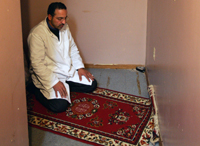Promoting Reconciliation and Moderation in Iraq
USIP is building on its successful efforts to promote reconciliation by broadening the scope of dialogue at the grassroots and national levels.
 Network of Iraqi Facilitators
Network of Iraqi Facilitators
In the most violent areas of Iraq, driven by ethnic and sectarian divides, USIP’s Network of Iraqi Facilitators (NIF) has provided conflict management training, facilitated dialogue between conflicting groups, and solved local problems, contributing to the fragile peace that Iraqis are finally beginning to enjoy today. Since 2004, USIP’s Academy for Conflict Management and Peacebuilding has trained and mentored these facilitators in crucial skills of conflict analysis, communication, negotiation, third-party facilitation and mediation, and problem solving. In application of the skills, members of the network, who have been drawn from across Iraq’s geographic, ethnic, and confessional landscapes, support other USIP programming, including Justice and Security Dialogues, Women’s Toolkit, and other projects. They also develop their own initiatives, under close USIP mentorship, to bring together government, tribal, religious, and civil society leaders in efforts to reduce tensions and build peace.
Confronting the Truth: Transitional Justice in Iraq
USIP recently concluded its project to spread awareness of transitional justice mechanisms in Iraq. In partnership with the Ministry of Human Rights, USIP conducted over 80 workshops throughout Iraq, facilitating discussions of past human rights abuses and the appropriate timing, forum, and process for a national dialogue on reconciliation. The Ministry produced a report on the findings of the project, which called for evaluating the performance of institutions of national reconciliation and examining the potential role for tribal leaders, clergy, NGOs and the private sector in reconciliation efforts. In July, USIP and the Ministry of Human Rights hosted a conference, attended by the Minister of Human Rights, to present the report and the impacts of the project.

Facilitating Community Discussions on Religious Peacemaking in Iraq
In 2009, USIP premiered an Arabic language version of the documentary film chronicling interfaith reconciliation in Nigeria, "The Imam and the Pastor." The film resonated deeply with religious leaders in attendance from all 18 of Iraq’s provinces who requested its broad dissemination. USIP is now developing a curriculum to accompany screenings and training for religious leaders to facilitate community discussions on religious reconciliation and pluralism.
Preventing Media Incitement to Violence
The Center of Innovation for Media, Conflict and Peacebuilding partnered with the Annenberg School for Communication at the University of Pennsylvania and UNESCO to continue efforts to prevent media incitement to violence in Iraq. Building on the previously published guidelines designed to limit inflammatory reporting – distributed prior to the national elections in Iraq in March of 2010 – the Center and the Annenberg team conducted a content analysis of pre-election media coverage on five of the most watched Iraqi TV channels. This research revealed how Iraqi media currently use inflammatory language and how they can report in ways that will support successful elections. This stage will be followed by a workshop for news directors, media regulators, and civil society media monitors to learn content analysis methods and to collaboratively develop a conflict-sensitive reporting style guide. The diverse group of participants will then be able to customize these resources for use at their own organizations as a means of preventing media incitement to violence.
National Dialogue
USIP for several years has contributed its expertise and convening skills to a national dialogue among Iraqi parliamentarians focused on reconciliation issues. Organized principally by the Italian nongovernmental organization Ipalmo, this dialogue has improved inter-sectarian and inter-ethnic understanding, moderated political positions and helped to open a path towards a more formal reconciliation process both in parliament and in Iraqi society.